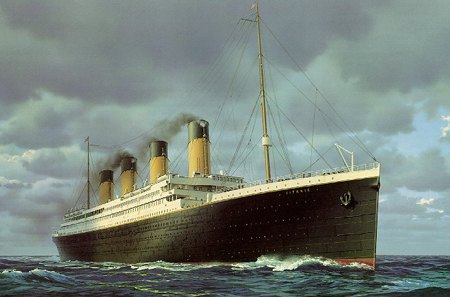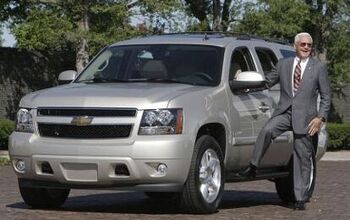General Motors Death Watch 146: The UAW Strikes Again
After more than a week of overtime negotiations, the United Auto Workers (UAW) is on strike at General Motors. For those who think this action signals the beginning of the end for The General: yes and no. On the yes side, the strike will highlight the original sins that led both sides to this point. The executive greed and mismanagement. The union intransigence and denial. The strike will alert the dim-witted media that the Emperor hasn’t been wearing any clothes for decades, ding GM's rep, and make it even more difficult for the carmaker to sell cars. On the no side, GM will settle. A compromise will be reached. The same players will resume the game, poorer but no wiser.
The strike stems from one simple fact: the UAW is unwilling to take a hit for the team. As I’ve stated many times, trade unions are not in the business of surrendering wages, benefits or working conditions. It’s not in their nature. All the previous UAW “givebacks”– which supposedly signaled the union’s willingness to sacrifice for the good of the company– were nothing of the sort. They were payoffs. You want us to give up jobs? Create an attrition program. You want to increase our health care co-pays? Stick $2b in the bank. The UAW puts the “pro” in quid pro quo.
Can you really blame the UAW for holding fast to this "you'll get what you pay for" philosophy? Sure, analysts and media pundits have been bleating on about the need for GM to trim its labor costs to keep pace with their non-union competition. But how can a union member be expected to make a sacrifice when the company’s top players are paying themselves tens of millions of dollars in salary and bonuses? Do as I say, not as I do? I don’t think so.
GM went into these negotiations determined to create a $51b union-administered VEBA health care superfund. As always, the UAW was listening to WIIFM (What’s In It For Me?). You want to dump your health care liabilities on us? Show me the money. Not 65 cents on a dollar. Not 50 percent stock, 50 percent cash. A $51b health care VEBA will cost you… $51b. And while we’re at it, let’s have some job guarantees and a nice fat signing bonus.
The fact that GM didn’t give the union what it wanted has nothing to do with testicular fortitude. If GM had the money to cut the deal, they would have cut the deal. But they don’t, so they didn’t. Ten or twenty years ago, GM could have written a check or, at the least, rung-up a few bankers and arranged favorable financing. No more. Cash-wise, Forbes says they're sitting on $32b. Take off a $10b float, add up their ongoing liabilities, consider the cost of borrowing $51b and it's no wonder the VEBA was a stock-heavy deal. Or that the union walked.
Which leaves us here: either GM will borrow the “extra” money at usurious rates to establish their beloved VEBA and settle the strike, or they’ll dump the VEBA and settle the strike with a new wage structure and working conditions. That's provided GM has the money to pay off the union for these “givebacks.” If GM can't pay the freight for ANY changes in the UAW's wages, benefits or working rules, they’ve either got to keep on paying the current rate plus a little bit ‘mo (‘cause there’s always a little bit ‘mo) or go nuclear: sit it out, file chapter 11 and hit reset.
Again, in all likelihood, GM will cave. Just as the UAW never surrenders, GM never stares them down. Meanwhile, the UAW strike is pouring gas on GM's cash conflagration. The UAW's 53-day, 9200 worker strike against GM in 1998 cost the automaker an estimated $2b or roughly $37m a day. This time 'round, 73k UAW members are on strike. This industrial action could cost GM as much as $300m per day. At that rate, GM's entire cash pile would be gone in 106 days. What's more, if GM is too cash-strapped to buy off the union now, what hope will there be in a month or more?
At the same time, the more GM publicly justifies its negotiating position– we can't keep up with the Toyotas of the world with our sky-high UAW labor costs– the more people will hear "GM can't compete." And that story renders GM's PR narrative– our house is now in order and we're on the cusp of a major product-led renaissance– meaningless. In fact, with each passing day of this strike, GM will look more and more like what it is: an old-fashioned, incompetent, easily-distracted automaker caught flat-footed by its modern, focused, streamlined, non-union competition.
More by Robert Farago
Latest Car Reviews
Read moreLatest Product Reviews
Read moreRecent Comments
- Redapple2 Love the wheels
- Redapple2 Good luck to them. They used to make great cars. 510. 240Z, Sentra SE-R. Maxima. Frontier.
- Joe65688619 Under Ghosn they went through the same short-term bottom-line thinking that GM did in the 80s/90s, and they have not recovered say, to their heyday in the 50s and 60s in terms of market share and innovation. Poor design decisions (a CVT in their front-wheel drive "4-Door Sports Car", model overlap in a poorly performing segment (they never needed the Altima AND the Maxima...what they needed was one vehicle with different drivetrain, including hybrid, to compete with the Accord/Camry, and decontenting their vehicles: My 2012 QX56 (I know, not a Nissan, but the same holds for the Armada) had power rear windows in the cargo area that could vent, a glass hatch on the back door that could be opened separate from the whole liftgate (in such a tall vehicle, kinda essential if you have it in a garage and want to load the trunk without having to open the garage door to make room for the lift gate), a nice driver's side folding armrest, and a few other quality-of-life details absent from my 2018 QX80. In a competitive market this attention to detai is can be the differentiator that sell cars. Now they are caught in the middle of the market, competing more with Hyundai and Kia and selling discounted vehicles near the same price points, but losing money on them. They invested also invested a lot in niche platforms. The Leaf was one of the first full EVs, but never really evolved. They misjudged the market - luxury EVs are selling, small budget models not so much. Variable compression engines offering little in terms of real-world power or tech, let a lot of complexity that is leading to higher failure rates. Aside from the Z and GT-R (low volume models), not much forced induction (whether your a fan or not, look at what Honda did with the CR-V and Acura RDX - same chassis, slap a turbo on it, make it nicer inside, and now you can sell it as a semi-premium brand with higher markup). That said, I do believe they retain the technical and engineering capability to do far better. About time management realized they need to make smarter investments and understand their markets better.
- Kwik_Shift_Pro4X Off-road fluff on vehicles that should not be off road needs to die.
- Kwik_Shift_Pro4X Saw this posted on social media; “Just bought a 2023 Tundra with the 14" screen. Let my son borrow it for the afternoon, he connected his phone to listen to his iTunes.The next day my insurance company raised my rates and added my son to my policy. The email said that a private company showed that my son drove the vehicle. He already had his own vehicle that he was insuring.My insurance company demanded he give all his insurance info and some private info for proof. He declined for privacy reasons and my insurance cancelled my policy.These new vehicles with their tech are on condition that we give up our privacy to enter their world. It's not worth it people.”


































Comments
Join the conversation
RF, Who blinked first GM, the UAW or was it both together? To reach a tentative agreement early this morning.
It(tentative agreement) that the "glory" of Lump sum payments will help the UAW brothers and sisters to accept the new contract with GM, it also looks like the Union did not get assurances that GM would not our source more jobs overseas